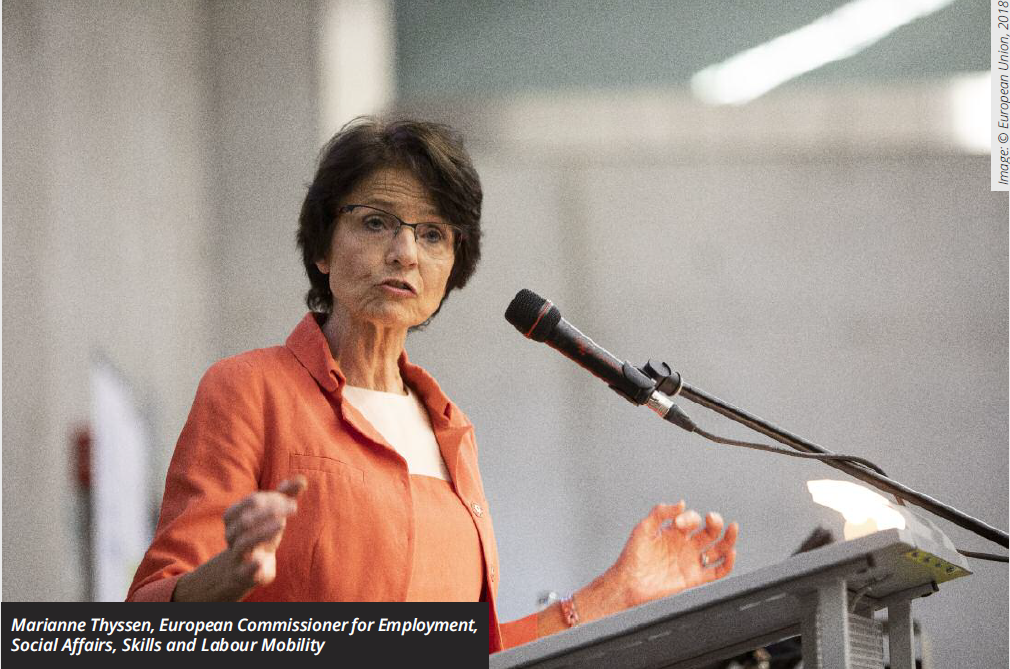Marianne Thyssen, European Commissioner for Employment, Social Affairs, Skills and Labour Mobility explains how a new Europass ensures better communication of skills and qualifications in Europe today
For over a decade Europass has made it easier for people to study or work across Europe, by making their skills and qualifications easily understood. Europass tools have served as a crucial bridge between the world of work and education and training. Millions of people have used it to communicate skills, experiences, qualification and credits, as well as languages, learned while on mobility, at work and volunteering. The Europass CV alone has been downloaded more than 100 million times since 2004.

Now the time has come for change and modernisation. When looking for jobs or new opportunities today, it goes without saying that how we communicate and what we communicate has changed dramatically. Europass was originally built around a limited portfolio of documents. The Europass CV – recognised all over Europe – is the most widely known template, but Europass also ensures, among other things, a common understanding of language skills and diplomas obtained. With the adoption of the new Europass Decision by the Council and Parliament in April 2018, we now have an exciting opportunity to modernise Europass and respond to the changing needs of learners and workers.
I proposed an ambitious and forward-looking service. The new Europass will offer an e-portfolio for people to manage their learning and careers – they can store and share information on work experience, education and references, create digital documents such as CVs and access tools to self-assess their skills. This will make it even easier for people to make their skills and qualifications more visible and for employers to assess a job applicant’s knowledge and experience.
For the first time, Europass will offer information to support career management including information on skills trends and demands in the labour market and on guidance and learning opportunities across Europe. This will help people make informed choices about their career. On top, it will be a useful tool for policymakers looking to adapt training and employment policies based on labour market needs and trends. The new Europass will respond to the changing nature of the European labour market, embracing digital technology to connect individuals with employers, guidance services and education and training providers more easily.
Europass remains a tool to support communication of skills and qualifications but importantly it also remains a free and open public service available to everyone. The Commission is working with Member States and stakeholders to ensure Europass is relevant and accessible to everyone and in particular the low-skilled, persons with disabilities or other disadvantaged groups.
The new Europass is one of the actions of our “Skills Agenda for Europe”. Each of the 10 key actions seeks to make sure that Europe is ready to address fast-changing skills needs and to seize the opportunities of the changing world of work. We have now rolled out all 10 actions of the Skills Agenda and we are starting to see the results on the ground.
At the core of the agenda is the simple fact that having the right skills is a route to empowerment and opportunity for all. A skilled, mobile workforce can enable social progress, growth and competitiveness. The vision for Europass and each of the Skills Agenda actions underpin our “European Pillar of Social Rights”. The very first principle of the Pillar underlines the right to quality and inclusive education, training and life-long learning. The new Europass will actively support these rights by putting information and tools in the hands of Europeans to support their career management and communication of their skills. Work has begun on the implementation of the new Europass – the project will take forward the Pillar in a real and practical way, focus on user needs and put Europe firmly on a lifelong learning path.
Marianne Thyssen
European Commissioner for Employment, Social Affairs,
Skills and Labour Mobility
European Commission
https://ec.europa.eu/commission/commissioners/2014-2019/thyssen_en











